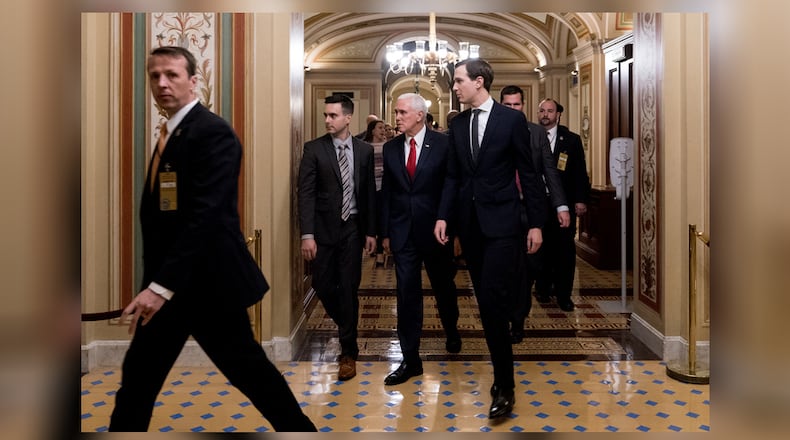Vice President Mike Pence, Trump son-in-law and senior adviser Jared Kushner and White House budget chief Mick Mulvaney left the Capitol late Friday after hours of bargaining with congressional leaders produced no apparent compromise.
“We don’t have a deal. We’re still talking,” Senate Appropriations Committee Chairman Richard Shelby, R-Ala., told reporters.
Late Friday, Mulvaney sent agency heads a memorandum telling them to “execute plans for an orderly shutdown.” He wrote that administration officials were “hopeful that this lapse in appropriations will be of short duration” — an expectation that was widely shared.
With negotiations expected to continue, the House and Senate both scheduled rare Saturday sessions. House members were told they'd get 24 hours’ notice before a vote.
The gridlock blocks money for nine of 15 Cabinet-level departments and dozens of agencies, including the departments of Homeland Security, Transportation, Interior, Agriculture, State and Justice.
This includes more than 400 jobs in the Miami Valley that would be affected by a partial government shutdown.
MORE RELATED COVERAGE:
>> Government partially shuts down as lawmakers work toward deal
>> When was the last government shutdown? A timeline of U.S. shutdowns
>> What is a partial government shutdown?
>> Will airports be affected by government shutdown?
>> Will Social Security checks be affected by government shutdown?
>> NORAD’s Santa Tracker not affected by shutdown
>> Jamie Dupree blog: In fight over border wall, Trump, Congress stumble into partial shutdown
>> Air Force veteran starts GoFundMe page to help fund border wall
>> Online fundraiser counters GoFundMe campaign for border wall
>> Partial government shutdown could affect 800,000 federal workers
The lack of funds will disrupt many government operations and the routines of 800,000 federal employees. Roughly 420,000 workers were deemed essential and will work unpaid just days before Christmas, while 380,000 will be furloughed, meaning they’ll stay home without pay.
Those being furloughed include nearly everyone at NASA and 52,000 workers at the Internal Revenue Service. About eight in 10 employees of the National Park Service will stay home, and many parks were expected to close.
The Senate passed legislation ensuring workers will receive back pay, which the House was expected to approve.
Some agencies, including the Pentagon and the departments of Veterans Affairs and Health and Human Services, already were funded for the year in agreements reached earlier, and they will operate as usual.
The U.S. Postal Service, busy delivering packages for the holiday season, will not be affected because it’s an independent agency. Social Security checks will still be mailed, troops will remain on duty and food inspections will continue.
Also still functioning will be the FBI, the Border Patrol and the Coast Guard. Transportation Security Administration officers will continue to staff airport checkpoints, and air traffic controllers also will remain at work.
Trump said last week he’d be “proud” to have a shutdown and saying Friday he was “totally prepared for a very long” closure.
OUR GREAT COUNTRY MUST HAVE BORDER SECURITY! pic.twitter.com/ZGcYygMf3a
— Donald J. Trump (@realDonaldTrump) December 22, 2018
While many of Congress’ most conservative Republicans were welcoming such a confrontation, most GOP lawmakers have wanted to avoid one, since polling shows the public broadly opposes the wall and a shutdown over it.
“None of them have succeeded,” veteran Sen. Pat Roberts, R-Kan., said of past shutdowns.
He said the political fallout has always damaged “Republicans who said, ‘By God, we’ll show them.’ It doesn’t work that way, it just doesn’t.”
Trump said now was the time for Congress to provide taxpayers’ money for the wall, even though he’s said repeatedly that Mexico will pay for it — something that country has repeatedly rebuffed.
“This is our only chance that we’ll ever have, in our opinion, because of the world and the way it breaks out, to get great border security,” Trump said Friday.
Democrats will take control of the House Jan. 3, and they oppose major funding for wall construction.
Trump said he would accept money for a “Steel Slat Barrier” with spikes on the top, which he said would be just as effective as a wall.
Trump called GOP senators to the White House Friday morning, but Republicans said afterward that the session did not produce a strategy.
Early this week, the Senate approved a bipartisan deal keeping government open into February and providing $1.3 billion for border security projects but not the wall. In a GOP victory Thursday, the House rebelled and approved a package temporarily financing the government but also providing $5.7 billion for the border wall.
Friday afternoon, a Senate procedural vote showed that Republicans lacked the 60 votes they’d need to force that measure through their chamber. That jump-started negotiations between Congress and the White House.
“The biggest problem is, we just don’t know what the president will sign,” said Sen. Jeff Flake, R-Ariz.
So restive were senators returning to Washington that McConnell and others sported lapel buttons declaring them members of the “Cranky Senate Coalition.”
The White House said Trump did not go to Florida on Friday as planned for the Christmas holiday.
